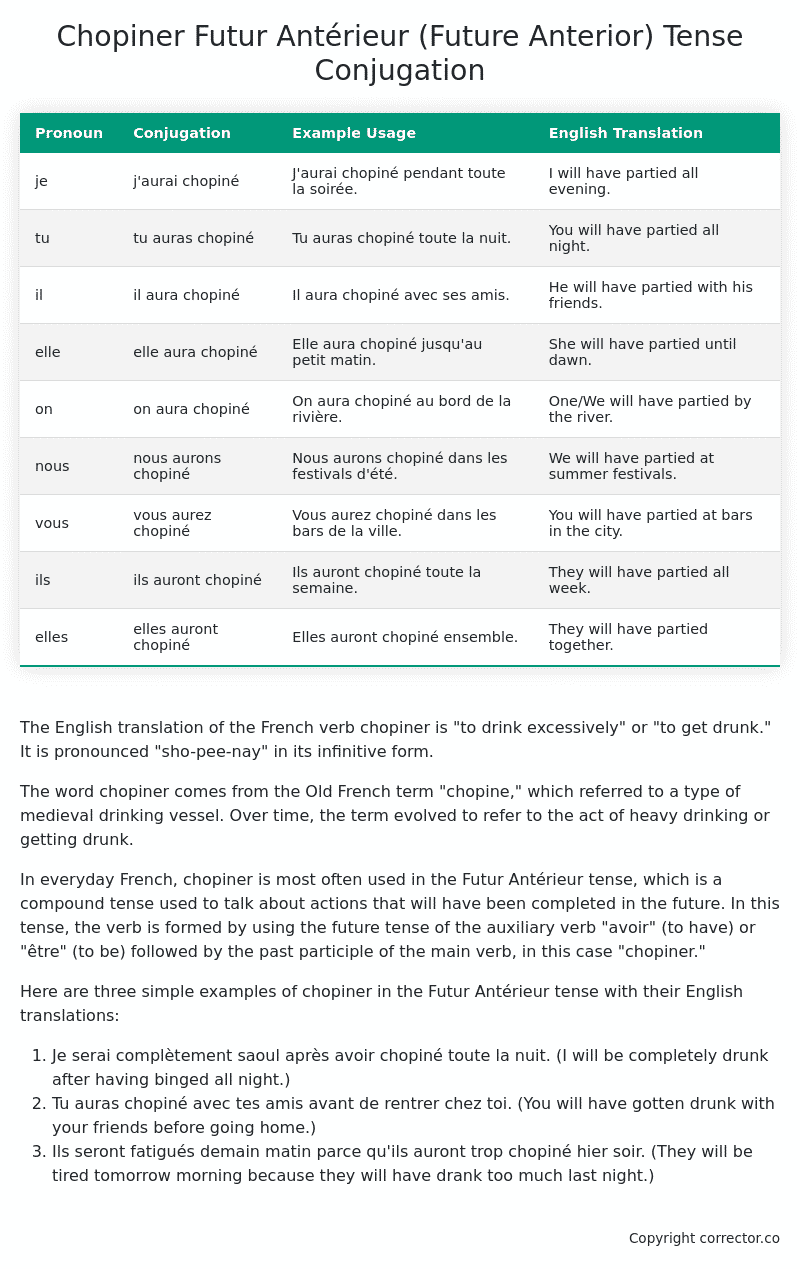Futur Antérieur (Future Anterior) Tense Conjugation of the French Verb chopiner
Introduction to the verb chopiner
The English translation of the French verb chopiner is “to drink excessively” or “to get drunk.” It is pronounced “sho-pee-nay” in its infinitive form.
The word chopiner comes from the Old French term “chopine,” which referred to a type of medieval drinking vessel. Over time, the term evolved to refer to the act of heavy drinking or getting drunk.
In everyday French, chopiner is most often used in the Futur Antérieur tense, which is a compound tense used to talk about actions that will have been completed in the future. In this tense, the verb is formed by using the future tense of the auxiliary verb “avoir” (to have) or “être” (to be) followed by the past participle of the main verb, in this case “chopiner.”
Here are three simple examples of chopiner in the Futur Antérieur tense with their English translations:
- Je serai complètement saoul après avoir chopiné toute la nuit. (I will be completely drunk after having binged all night.)
- Tu auras chopiné avec tes amis avant de rentrer chez toi. (You will have gotten drunk with your friends before going home.)
- Ils seront fatigués demain matin parce qu’ils auront trop chopiné hier soir. (They will be tired tomorrow morning because they will have drank too much last night.)
Table of the Futur Antérieur (Future Anterior) Tense Conjugation of chopiner
| Pronoun | Conjugation | Example Usage | English Translation |
|---|---|---|---|
| je | j’aurai chopiné | J’aurai chopiné pendant toute la soirée. | I will have partied all evening. |
| tu | tu auras chopiné | Tu auras chopiné toute la nuit. | You will have partied all night. |
| il | il aura chopiné | Il aura chopiné avec ses amis. | He will have partied with his friends. |
| elle | elle aura chopiné | Elle aura chopiné jusqu’au petit matin. | She will have partied until dawn. |
| on | on aura chopiné | On aura chopiné au bord de la rivière. | One/We will have partied by the river. |
| nous | nous aurons chopiné | Nous aurons chopiné dans les festivals d’été. | We will have partied at summer festivals. |
| vous | vous aurez chopiné | Vous aurez chopiné dans les bars de la ville. | You will have partied at bars in the city. |
| ils | ils auront chopiné | Ils auront chopiné toute la semaine. | They will have partied all week. |
| elles | elles auront chopiné | Elles auront chopiné ensemble. | They will have partied together. |
Other Conjugations for Chopiner.
Le Present (Present Tense) Conjugation of the French Verb chopiner
Imparfait (Imperfect) Tense Conjugation of the French Verb chopiner
Passé Simple (Simple Past) Tense Conjugation of the French Verb chopiner
Passé Composé (Present Perfect) Tense Conjugation of the French Verb chopiner
Futur Simple (Simple Future) Tense Conjugation of the French Verb chopiner
Futur Proche (Near Future) Tense Conjugation of the French Verb chopiner
Plus-que-parfait (Pluperfect) Tense Conjugation of the French Verb chopiner
Passé Antérieur (Past Anterior) Tense Conjugation of the French Verb chopiner
Futur Antérieur (Future Anterior) Tense Conjugation of the French Verb chopiner (this article)
Subjonctif Présent (Subjunctive Present) Tense Conjugation of the French Verb chopiner
Subjonctif Passé (Subjunctive Past) Tense Conjugation of the French Verb chopiner
Subjonctif Imparfait (Subjunctive Imperfect) Tense Conjugation of the French Verb chopiner
Subjonctif Plus-que-parfait (Subjunctive Pluperfect) Tense Conjugation of the French Verb chopiner
Conditionnel Présent (Conditional Present) Tense Conjugation of the French Verb chopiner
Conditionnel Passé (Conditional Past) Tense Conjugation of the French Verb chopiner
L’impératif Présent (Imperative Present) Tense Conjugation of the French Verb chopiner
L’infinitif Présent (Infinitive Present) Tense Conjugation of the French Verb chopiner
Struggling with French verbs or the language in general? Why not use our free French Grammar Checker – no registration required!
Get a FREE Download Study Sheet of this Conjugation 🔥
Simply right click the image below, click “save image” and get your free reference for the chopiner Futur Antérieur tense conjugation!

Chopiner – About the French Futur Antérieur (Future Anterior) Tense
Construction
Common Everyday Usage Patterns
Interactions with Other Tenses
For example
Summary
I hope you enjoyed this article on the verb chopiner. Still in a learning mood? Check out another TOTALLY random French verb conjugation!


